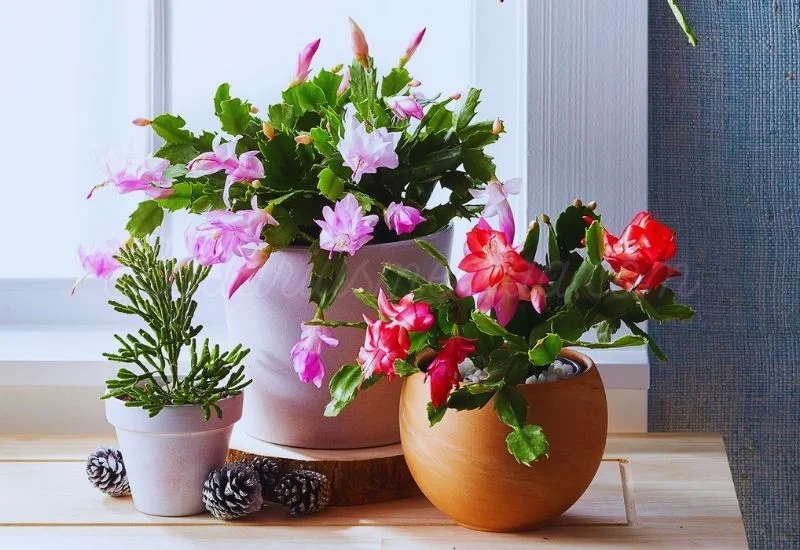Christmas cactus, also known as Schlumbergera, is one of the most famous holiday season plants. It is not only known for its leaves but also for its pinkish flowers. This makes these plants attractive to both humans and animals, especially cats and dogs.
Cats may chew and eat Christmas cactus in large quantities. Due to this, they face severe health problems, such as blockage of the gastrointestinal tract and other digestive issues.
However, you can easily protect your cats and dogs from the dangers of this cactus. In this blog post, you will read a comprehensive discussion about the relationship between the Christmas cactus and cats.
Let’s start our discussion!
What are the Potential Dangers of Christmas Cactus to Cats?

Christmas cactus is a beautiful species of cactus that originates from the rainforests of Brazil. They grow in a high-humidity environment. Due to their beautiful pink-colored flowers, people grow them in their homes. Where they enhance the beauty of your home, there they can prove dangerous for your pets.
People mostly keep dogs and cats as pets in their homes. They can eat or lick the Christmas Cactus due to several reasons. According to the American Society for the Prevention of Cruelty to Animals (ASPCA), this plant is non-toxic for pets, especially dogs and cats. At the same time, they highly recommend preventing your pets from taking such plants in high quantities.
A high quantity of Christmas Cactus will cause several health problems, such as the following:
- Irritation in Gastrointestinal Tract
When a cat eats this cactus in large quantities, indigestible fibrous material accumulates in the stomach. Due to the presence of cellulose, the stomach is not able to digest it due to the absence of digestive enzymes. The fibrous material will first damage the lining of the stomach and intestines.
At the same time, it will induce vomiting in cats. This is due to the defense system of animals. Vomiting will remove the indigestible material from the body. Vomiting causes several other problems, like inflammation in the whole gastrointestinal tract.
However, if vomiting can’t remove that fibrous material, this will pass into the intestines. There, they will again damage the lining of the intestines. So, the body’s defense system will induce the production of more chemicals for their digestion and removal from the body. This will result in mild diarrhea.
- Appetite Issues
Appetite issues are common when cats ingest Christmas cactus, as it contains indigestible material. It will accumulate in the stomach and will fill most of the space in the stomach. Due to this, cats can’t intake more food and face a loss of appetite. At the same time, it will create a feeling of nausea in them and discomfort in the stomach.
- Abdominal Pain
The presence of indigestible material in a cat’s stomach will cause inflammation in the stomach lining. This will cause cramps in the cat’s stomach. Due to this, cats will not be able to move and will avoid playing, running, and even walking. At the same time, they will not allow anyone to touch them. These are some signs of abdominal pain.
- Sleeping Problems
Cats may sleep more and show passive behavior after ingesting Christmas cactus. The very first reason is the low energy levels due to the indigestion. At the same time, the accumulated indigestible material will cause pain and irritation in the stomach and intestine. This results in a decrease in the interest in playing, exploring, and running.
- Blockage in the Digestive System
Sometimes, even diarrhea can’t remove the indigestible material from the stomach. Due to this, the fibrous material of Christmas Cactus will accumulate in different places of the digestive system. It will actually stop the passage of materials. In such cases, cat owners should immediately take them to a vet.
You may observe the symptoms, such as drooling and redness in the mouth and throat. These are also signs of Christmas cactus.
What are the Treatments of Christmas Cactus Poison?
If anyone observes any of the symptoms in their cats, they will contact their vet immediately. He will conduct several physical examinations on the cat to know the reasons for such symptoms. At the same time, he can suggest any of the following treatments according to the condition of the cat:
- First of all, keep the cat hydrated with the fresh water. It will not only avoid dehydration but also help to remove the fibrous material from your cat’s body.
- During this period, you have to provide your cat with a soft diet, such as boiled chicken and rice, so that they can digest it easily.
- Anti-nausea medicines can be used to stop the feeling of nausea.
- To continue the food, cats should be provided with delicious food. Moreover, there are several appetite stimulants that induce appetite in your cats.
- There are different medicines to relieve abdominal and intestinal pain.
During the whole treatment, you have to maintain an environment in which the cat can get maximum comfort and no laborious activity.
Why Do Cats Eat Christmas Cactus?

Cats are very curious animals. They keep on exploring different things and lick the items in which they are interested. However, some people suggest that cats and dogs eat indigestible grass to remove the parasites from their stomachs and intestines. In fact, grass or Christmas cactus can induce vomiting and diarrhea. This results in the removal of everything from the stomach.
There may be some other reasons behind this behavior, such as the following:
- When cats get bored, they do different attention-seeking activities. They normally do activities in which they are not involved. Chewing the Christmas cactus may be one of the activities that is sought.
- Young or adult cats might chew the grass or plants to fix their gums and teeth. As the Christmas cactus appears firm and smells good, they are naturally attracted to it. At the same time, its taste is flavorful for cats. So this makes it more than just an exploratory plant.
- Cats belong to natural hunters. Sometimes, the natural hunting instinct is induced in the cats. This will motivate them to chew or bite the plants, considering that they are small animals.
Is Christmas Cactus Safe for Cats?
Christmas cactus is not a toxic plant. It doesn’t have any specific chemicals in it that make it poisonous or life-threatening. But at the same time, its composition makes it indigestible. Due to the presence of cellulose fibrous materials in it, the cat’s digestive system is unable to digest it due to the absence of certain enzymes.
At the same time, it is also not included in the list of safe plants. Due to the large amount of intake or chewing of this plant, your cat may suffer different types of digestive tract problems.
Conclusion
Although Christmas cactus comes with its benefits, you should still prevent your cats from making contact with them. People suggest different types of cat toys as their alternative. So that they will remain mentally and physically stimulated to prevent boredom. At the same time, you have to take care of your cat’s dietary routine.
